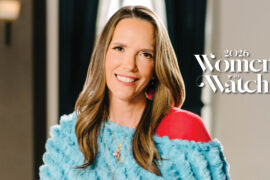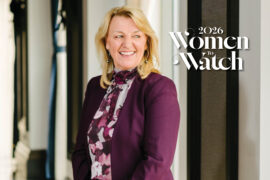By Shayna Mace | Photo by Hillary Schave
Every April, Black Maternal Health Week (this year April 11-17) is “a national week of action that aims to raise awareness around racial inequities in maternal health outcomes in the United States,” according to the Center for Reproductive Rights.
It’s a well-documented phenomenon that medical care is not equitable for people of color. According to the February 2025 article “Racial disparities in intrapartum care experiences and birth hospital characteristics,” co-authored by the University of Wisconsin-Madison’s Tiffany Green, Ph.D., director of the Reproductive Equity Action Lab and Gloria E. Sarto, MD, and Ph.D. chair in Women’s Health and Health Equity Research: “While all birthing people are entitled to respectful and person-centered care, in practice, Indigenous and Black birthing persons are more likely than their white counterparts to endure negative intrapartum experiences including disrespect and lack of responsiveness to their needs.”
Several area women have made it their priority to not only improve prenatal and postnatal experiences for Black birthing people, but to influence system wide change. Here are their stories.
Compassionate Care for All
 At Harambee Doula Care and Holistic Services, director of doula programming Chandra Lewis says their focus is “the Black birthing body.” Harambee’s essential doula and midwife services, along with perinatal education, are filling an important need for the primarily lower- income, Black pregnant people they work with.
At Harambee Doula Care and Holistic Services, director of doula programming Chandra Lewis says their focus is “the Black birthing body.” Harambee’s essential doula and midwife services, along with perinatal education, are filling an important need for the primarily lower- income, Black pregnant people they work with.
A Community Health Champion
 As the oldest active Black doula in Dane County, Uchenna Jones has helped birth over a thousand babies. She’s also witnessed the increase of more doulas of color joining the ranks over her 23-year tenure.
As the oldest active Black doula in Dane County, Uchenna Jones has helped birth over a thousand babies. She’s also witnessed the increase of more doulas of color joining the ranks over her 23-year tenure.
“I did my [doula] training through Doulas of North America (DONA) because they’re the pioneer and leader in doula training. I [went back for] more advanced training about 16 years later. In that [timeframe], it went from a pretty much all-white space to an all-brown space. I watched that shift happen, which is pretty amazing because when I [trained] 23 years ago, I was the only Black student, and there was another student of Asian descent,” says Jones.
A Determined Doula
 When we speak over video chat on a sunny winter afternoon, Qwantese Winters appears radiant, discussing her journey to becoming a doula. Winters is founder of Oasis Maternal Care and care coordinator for First Care Clinic, a pregnancy resource center for women offering free, confidential services including counseling, pregnancy and STI testing. She’s also a 2024 BRAVA Woman to Watch.
When we speak over video chat on a sunny winter afternoon, Qwantese Winters appears radiant, discussing her journey to becoming a doula. Winters is founder of Oasis Maternal Care and care coordinator for First Care Clinic, a pregnancy resource center for women offering free, confidential services including counseling, pregnancy and STI testing. She’s also a 2024 BRAVA Woman to Watch.
Black Women at the Forefront of Change
 In 2019, BRAVA’s feature titled “Empowering Mothers and Saving Babies” detailed how Madison-area Black women were leading the way toward lower infant mortality rates.
In 2019, BRAVA’s feature titled “Empowering Mothers and Saving Babies” detailed how Madison-area Black women were leading the way toward lower infant mortality rates.
Between 2019 and 2021, the Black infant mortality rate was 13.2 per 1,000 live births, compared to 4.4 per 1,000 for white babies (courtesy “Wisconsin Data Resource: Birth Outcomes, 2021”). Put simply, the Black infant mortality rate was nearly three times higher. In 2023, that number edged down slightly to 12.8 infant deaths per 1,000 for Black babies. White mortality rates stayed the same at 4.4 per 1,000 live births, according to the Wisconsin Department of Health Services Infant Mortality Dashboard.
Healthy Heart, Healthy Parent
 Dr. Kara Hoppe, fetal medicine doctor and associate professor at the University of Wisconsin School of Medicine and Public Health, has the best of both worlds: She meets with patients as well as spearheads important research concerning hypertension in birthing people during and post-pregnancy.
Dr. Kara Hoppe, fetal medicine doctor and associate professor at the University of Wisconsin School of Medicine and Public Health, has the best of both worlds: She meets with patients as well as spearheads important research concerning hypertension in birthing people during and post-pregnancy.
“I feel like research is the way to make changes that inform care and to … improve care for people. I wanted to make sure research was a part of my career. So much so that I started a master’s degree in clinical investigation at the university here when I joined the faculty,” explains Dr. Hoppe.
Data-Driven Successes
Lewis says Harambee tracks healthy birth outcomes using clients’ breastfeeding initiation, pelvic versus surgical births, whether babies have healthy birth weights (above 5 pounds, 8 ounces) and what gestational age (greater than 37 weeks) babies are born at.
“In 2024, we had 163 referrals. 85% of those families initiated breastfeeding, and 82% continued breastfeeding. The anecdotally reported caesarean rate for Dane County hospitals was about 25%. The caesarean rate within [Harambee] was about 22%. So, it’s a small change, but we were able to decrease some unnecessary caesareans. We’re hoping to build on that trend so it continues to be lower than the hospital rate. We are also seeing babies born at later gestational ages (average gestation at 38 weeks),” says Lewis.
To give historic context, in 2018, Lewis says the breastfeeding rate at hospital discharge at UnityPoint Health – Meriter was 84.4% for white babies versus 57.7% for African American babies. A small (40-participant) 2021 pilot between Meriter and Harambee showed that breastfeeding initiation was 98% at discharge and exclusive breastfeeding was around 80% at discharge for Black mothers and infants — a marked improvement. Lewis says the pilot also included year-long educational sessions on implicit bias and cultural sensitivity training with Meriter NICU faculty and leadership staff — which continues to this day.




